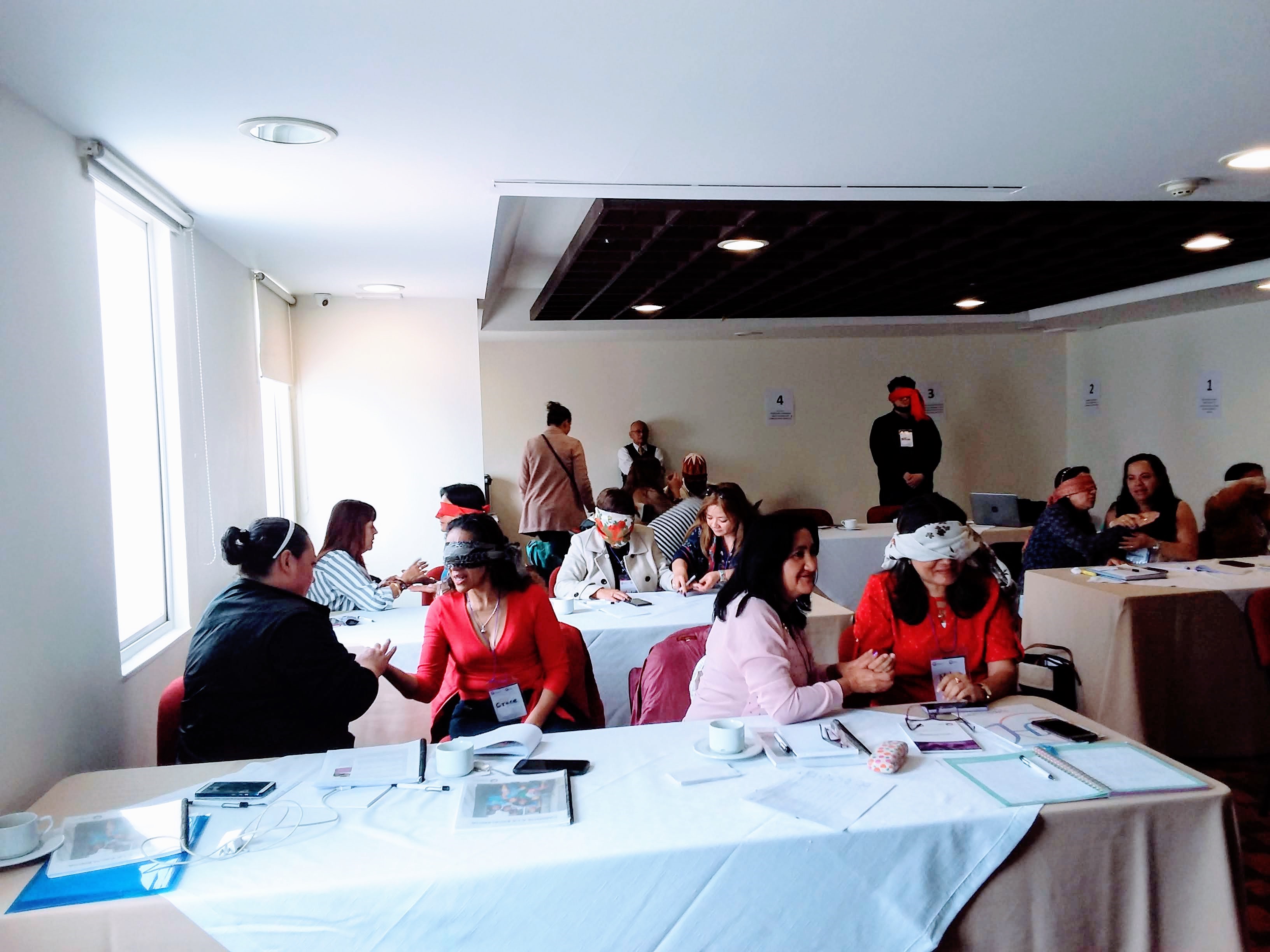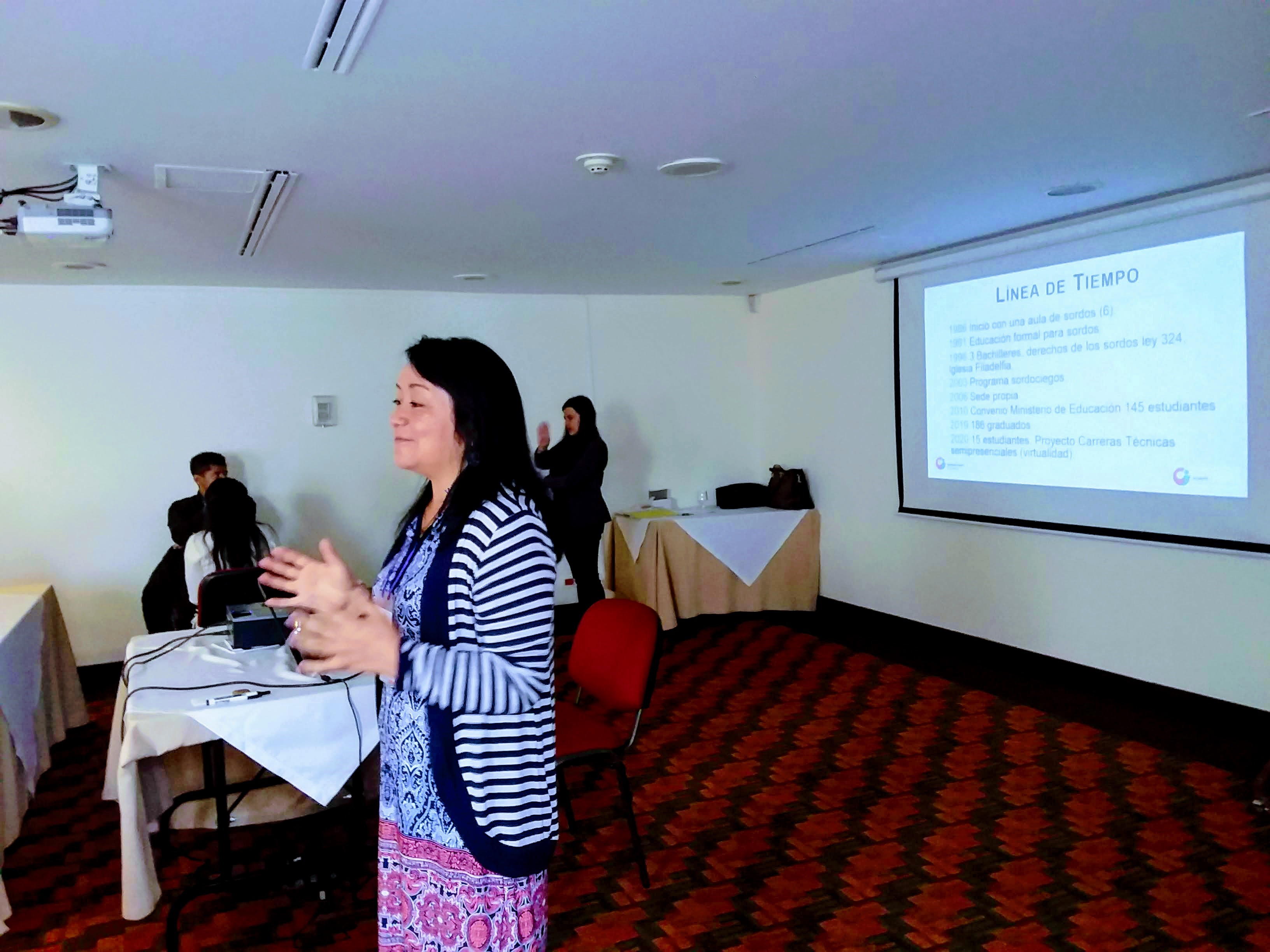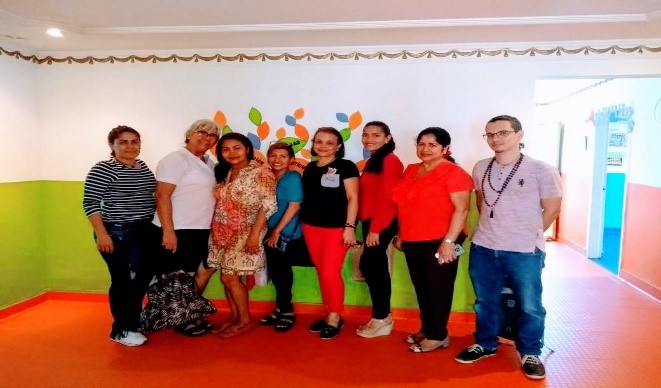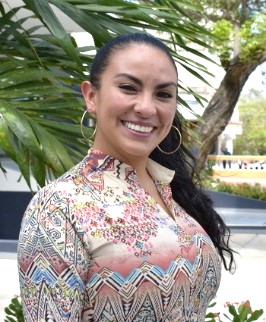Inclusive Education: Learning from Colombian educators
Inclusive education is not a ‘niche’ area of expertise. It should be a requirement of all school leaders and educators to ensure equitable access to quality education for all learners. While training for this area is not required (or even accessible) for most educators, continuous professional development opportunities for school leaders and teachers are crucial for promoting inclusive education practices.
For the majority of school leaders who participate in the EduQuality program at Opportunity EduFinance, they assess their school’s performance is at the lowest level on indicators of holistic education quality in the Pathways to Excellence framework. School leaders frequently indicate a desire to offer education through an inclusive framework and provide quality education to students who may have some form of a disability. However, without practical, contextualized guidance on real improvements, many do not know how or where to begin. The pathway to delivering a more inclusive, quality education can seem overwhelming and costly.
In the following blog, Senior Education Specialist, Andrea Camacho, shares how school leaders in Colombia are learning from two schools that have significant expertise in offering inclusive education to all learners.
EduQuality’s first Spanish sign language session
The first ever School Leadership Professional Development session facilitated in sign language - in Spanish – was delivered earlier this year in Colombia. EduQuality’s workshops for school leaders are much more than traditional lecture style seminars. They are two-day workshops designed to give school leaders and education specialists a chance to share and debate good practices, challenges, innovations and learnings around specific topics of education quality and school management. The most recent workshop in Colombia held in late January included a session on inclusive education. For the session, two schools were invited to present on their inclusive education models and best practices. A number of presenters shared their testimonies with the group using Colombian Sign Language, which was then translated for attendees.
Twelve percent of Colombians have some form of a disability. Findings published in a 2010 study titled “The Situation of Education in Colombia” estimated that 90% of children with disabilities do not attend a mainstream school, and only 27.4% of children with a disability between ages 6-11 years had access to education, compared with 85% education access for the general population.[1] The United Nations Sustainable Development Goal #4 emphasizes the importance of ensuring access to quality education for all children and young people. Countries must guarantee inclusive and equitable access in order to achieve quality learning and educational practices. Although this is a global goal, in reality many schools do not have the training or ability to deliver fully inclusive education without additional guidance and training.
During the January workshop, the session on ‘inclusion in education’ focused on administrative and pedagogical guidelines for educational care for students with disabilities and in vulnerable conditions. As part of the session agenda, Philadelphia School for the Deaf and the Superar Training Center were invited to present to their peers at their respective workshops in Bogotá and Barranquilla.
 PHILADELPHIA SCHOOL FOR THE DEAF shared the school’s history, achievements, challenges and commitment to the Pathway to Excellence framework. The most impactful part of their presentation was the testimonies given by teachers, students that are deaf and deafblind in sign language, and parents who shared their life experiences with the group. They also discussed key aspects of a school that are essential for inclusive education, such as adequate use of inclusive vocabulary, curricular flexibility, awareness and respect for differences and otherness.
PHILADELPHIA SCHOOL FOR THE DEAF shared the school’s history, achievements, challenges and commitment to the Pathway to Excellence framework. The most impactful part of their presentation was the testimonies given by teachers, students that are deaf and deafblind in sign language, and parents who shared their life experiences with the group. They also discussed key aspects of a school that are essential for inclusive education, such as adequate use of inclusive vocabulary, curricular flexibility, awareness and respect for differences and otherness.
Deaf and deafblind students at the school have a low socio-economic stratum in Colombia, between 1 and 3.[2] Families generally do not use Colombian Sign Language, but they do have the opportunity to take courses at the school for free. In addition, families can participate in the Happy Home Program, where they learn about deaf culture and share their experiences of raising their deaf sons and daughters.
When characterizing students at the schools, Director Patti V. Jones describes her students’ enthusiasm for learning. Most arrived ‘late’ to education and were restricted by lack of a language to communicate. She explains that when students learn to use Colombian Sign Language and connect to the deaf community, the happiness and freedom they feel is very evident. In her experinece, Director Jones says the deafblind are intelligent, creative, collaborative, and aware of their responsibility towards their families and their deaf and deafblind peers both nationally and internationally.
At the end of the presentation, school leaders in the session expressed their gratitude for the space to address such an important issue. Many noted their admiration for the work of the school in creating an inclusive environment for students and their families. Unprompted, school leaders shared promises to be increasingly vigilant in their own communities to identify children who require this type of support, since many are without opportunities and access to an education that meets their needs.
SUPERAR TRAINING CENTER shared about the educational services they offer to students with various characteristics, including autism, Down syndrome, Cerebral Palsy, Turner syndrome, attention deficit/hyperactivity disorder (ADHD), and cognitive defects. Director Nancy Elena Baños Ramírez explained the school’s pedagogical approach, which focuses on offering children comprehensive education, while defending and promoting individual differences. This provides an active inclusive educational model that meets the needs of all students.
The Superar Training Center has managed to respond to their students’ needs in ways which are challenging for many other schools. They have developed meaningful strategies for serving their students and manage to be a truly inclusive institution.The teaching team includes a psychologist, speech therapist and special educatation instructor. This team emphasizes a playful approach to teaching primary students to improve the process of setting expectations of each student, encouraging autonomy and providing them all the same opportunities other students have to develop fully.
Session attendees enthusiastically expressed their admiration and gratitude for the school leaders’ after sharing their testimony and experiences. Similar to the session in Bogotá, during the discussion time school leaders began proposing objectives to include in their own school development plans that would help improve their school’s inclusive education approach. Many shared appreciation for the EduQuality program providing this ‘unique opportunity’ for professional development, offering practical strategies to advance their education quality.
Opportunity EduFinance will continue to provide guidance and support to schools as they actively implement their school development plans, including improvements in inclusivity. We know that an inclusive approach is crucial to ensuring all students in Colombia can access a quality education. The EduQuality team will continue to offer unique professional development opportunities which enable school leaders to develop their own learning and apply it to their schools, benefiting the children they educate, their families and their communities.
School Profiles
 Philadelphia School for the Deaf is located Teusaquillo in Bogotá, Colombia, and has with 34 years experience in providing educational opportunities for preschool, primary and secondary students. The teaching team has deaf and hearing graduates and professionals, complemented by professional volunteers. There are psychology services, an interpretation guide for deafblind students, mediators for deaf students with multiple disabilities, and an entrepreneurship project.The school started in 1986 as a single classroom for 6 deaf students inside a school for hearing students. Director Patti V. Jones firmly believes in the right to education and participation, access to information, building leadership capacities, and the role for the deaf and deafblind to be agents of change for their own community.
Philadelphia School for the Deaf is located Teusaquillo in Bogotá, Colombia, and has with 34 years experience in providing educational opportunities for preschool, primary and secondary students. The teaching team has deaf and hearing graduates and professionals, complemented by professional volunteers. There are psychology services, an interpretation guide for deafblind students, mediators for deaf students with multiple disabilities, and an entrepreneurship project.The school started in 1986 as a single classroom for 6 deaf students inside a school for hearing students. Director Patti V. Jones firmly believes in the right to education and participation, access to information, building leadership capacities, and the role for the deaf and deafblind to be agents of change for their own community.
In 2019, when Philadelphia School for the Deaf learned about the EduQuality program offered by Opportunity EduFinance, they were eager to join. Senior EduSpecialist, Andrea Camacho, discussed the opportunity with the existing school cluster in their area. Members of Clúster Quality Ciudad Sur eagerly invited the school to join their cluster and contribute to shared learnings.
 Superar Training Center, located in Barranquilla, Colombia, has 27 years experience in offering educational opportunities for preschool and primary school levels. The school was founded in 1993 as an institution that provided training opportunities to low-income boys and girls in the southeast of the city. After viewing of the needs of the community, the Integral Care Center was founded as support to the institution, provide educational services to children. The school also has strategic allies, such as Casa de Cultur, which provides dance, music, arts and theater instruction. Director Nancy Elena Baños Ramírez is a trained special education instructor who has dedicated almost 30 years to serving the children of her region. She is a recognized leader in her community and works hard to guarantee the rights of her students.
Superar Training Center, located in Barranquilla, Colombia, has 27 years experience in offering educational opportunities for preschool and primary school levels. The school was founded in 1993 as an institution that provided training opportunities to low-income boys and girls in the southeast of the city. After viewing of the needs of the community, the Integral Care Center was founded as support to the institution, provide educational services to children. The school also has strategic allies, such as Casa de Cultur, which provides dance, music, arts and theater instruction. Director Nancy Elena Baños Ramírez is a trained special education instructor who has dedicated almost 30 years to serving the children of her region. She is a recognized leader in her community and works hard to guarantee the rights of her students.
Superar Training Center has been a member of their EduQuality school cluster, Semilleros, since 2017. Director Ramírez explains she was motivated to join to continuing improving their educational offering and share learnings with peers at other schools.
Andrea del Pilar A. Camacho is a Senior Education Specialist with the EduQuality Program in Colombia and provides support, training and guidance to forty low-fee private schools in Bogota and Barranquilla, Colombia. Andrea has 18 years’ experience as a teacher, educational advisor and coordinator of educational programs. She holds a Bachelor's Degree in Education Sciences: Mathematics and Physics and a Master's degree in Education.
[2] Social class in Colombia. https://en.wikipedia.org/wiki/Social_class_in_Colombia
